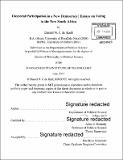Electoral participation in a new democracy : essays on voting in the new South Africa
Author(s)
De Kadt, Daniel, 1986-
DownloadFull printable version (12.97Mb)
Alternative title
Essays on voting in the new South Africa.
Other Contributors
Massachusetts Institute of Technology. Department of Political Science.
Advisor
Adam J. Berinsky.
Terms of use
Metadata
Show full item recordAbstract
Electoral participation is at the heart of democratic politics. Who comes to the polls, who does not, and why? In three essays that leverage natural experimental research designs, I advance new explanations for individual turnout, focused on citizens' access to, and experiences with the core electoral institutions of democracy. In paper 1 I show that policies focused on increasing access to elections can increase the size of the electorate, but also that they may carry compositional costs. Using new administrative data from South Africa and a difference-in-differences design, I show that the Independent Electoral Commission's large scale expansion of access to voting stations has increased national turnout by between 2.3 and 4.7 percentage points over the period 1999 to 2014. I then demonstrate, in the context of an administrative quasi-experiment, that those of high socio-economic status and those who are older are much more sensitive to electoral access than others. In paper 2 I explore whether differential representation in government shapes political behavior. I leverage the fact that the size of local government councils in South Africa follows a population-based formula with cutoffs that alter the degree of local representation. The results from a regression kink design suggest that at the margin the degree of representation is not particularly important for informing voters' decision to vote. Finally, paper 3 considers the effect of voting in South Africa's first democratic election in 1994 on future voting, and present evidence of the lasting behavioral effects of past participation using a regression discontinuity design. Eligibility to participate in 1994 affects future voting by 3 percentage points, with an average treatment effect of actually voting between 3.5 and 8.5 percentage points. I argue that persistence (or habituation) in voting behavior is at least partly driven by the creation of associations between first time voting and positive emotional states. If those who have positive electoral experiences are more likely to be particular types of voters, this can influence the trajectory of democracy.
Description
Thesis: Ph. D., Massachusetts Institute of Technology, Department of Political Science, 2017. Cataloged from PDF version of thesis. Includes bibliographical references (pages 179-190).
Date issued
2017Department
Massachusetts Institute of Technology. Department of Political SciencePublisher
Massachusetts Institute of Technology
Keywords
Political Science.